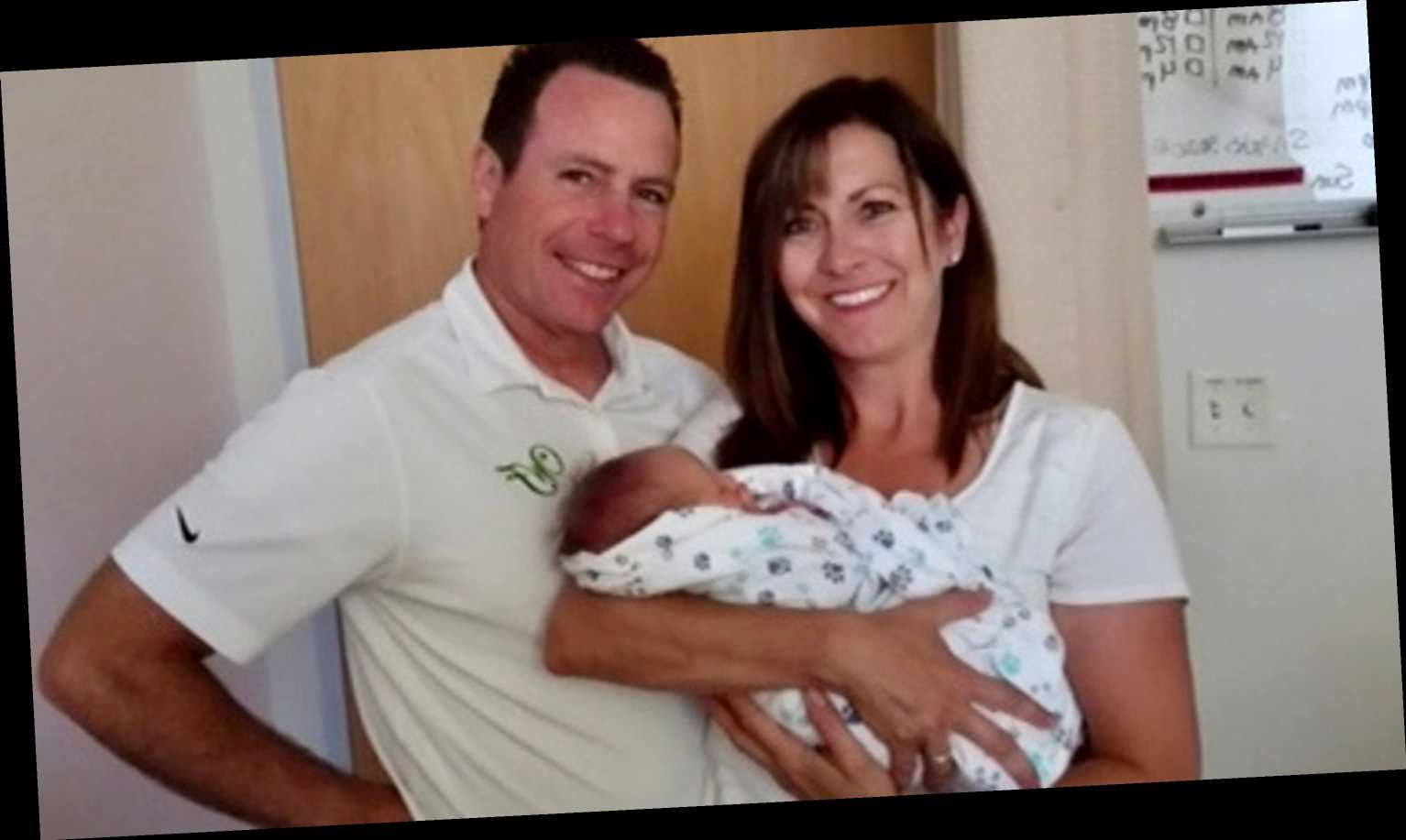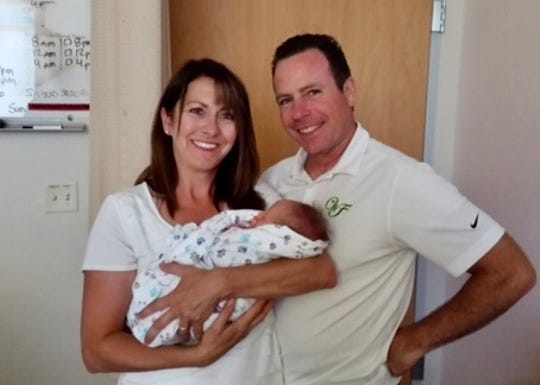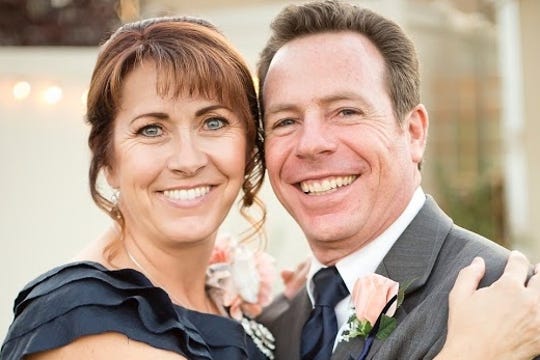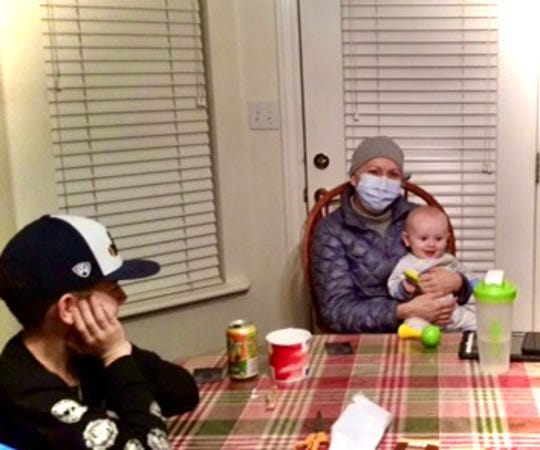Maria Lewis, husband Stephen and grandchild, Luke, three weeks before she would be diagnosed with triple-negative breast cancer. (Photo: Courtesy of Maria Lewis)
Maria Lewis had just received her diagnosis: triple-negative breast cancer and three to six months to live. An end-of-life counselor was brought in.
Nope.
The mother of six had soccer and play practices to attend. Her eldest son would need someone to snap photos of him and his date before he set out for the homecoming dance. She was a new grandmother, her grandson not even a month old.
Lewis, 50 at the time, sat in her car, researching alternative cancer treatments on her phone. She didn’t want to leave her children alone.
But to live, that’s exactly what she did.
October is Breast Cancer Awareness Month, so we are sharing Lewis’ story—a story of “hope.”
‘I just knew it was breast cancer’
Lewis is now in remission, two years after she was told of her diagnosis. But, the Saratoga Springs, Utah mother said she only recently told her children of her end-of-life prognosis.
“I’m a mother,” she explained. “I didn’t want to burden them. They knew what cancer meant, anyway. Everybody in our family dies of cancer.”
Lewis’ mother died of spinal cancer, which originate in her breast. Her father died of non-Hodgkin’s lymphoma. Her 37-year-old niece died of triple-negative breast cancer in March 2017.
She felt the lump in her right breast and went it in for a mammogram.
“I just knew it was breast cancer and my heart sank,” she said. “I didn’t think it would happen to me. I was active. I exercised every day. I never smoked or drank. But when cancer wants to get its grip on you, it’s just going to happen.”
Lewis was with diagnosed in July 2017, only four months after her niece died of the same thing. Triple-negative breast cancer, according to the National Breast Cancer Foundation, means it lacks the three receptors — estrogen, progesterone and HER-2/neu gene — that treatments target as a way to control the cancer. This means it can be more aggressive than other forms of the disease and is difficult to treat.
Long-distance treatment
Lewis’ oncologist at a large local cancer institute in Utah recommended 20 weeks of treatment with four different chemotherapy drugs to prolong her life, she said. The stay-at-home mom’s research brought her instead to Dr. Robert Nagourney at the Nagourney Cancer Institute in Long Beach, Calif.
“He told me you have a monster of a cancer but there is hope. And that’s what I needed to hear,” Lewis said.
The associate professor at the University of California, Irvine performs a functional profile test on cancer. A biopsy is done on a patient’s tumor and a lab test is performed to identify the specific drugs that kill the cancer.
Based on Lewis’ biopsy, he recommended six cycles of chemotherapy every three weeks with Carboplatin and Docetaxel. She would need to come to California for her treatment.
“She didn’t hesitate,” Nagourney said. “She was super energetic and super gung-ho. ‘Oh, no. I’m coming to California, she said.’ “
From her initial meeting until the end of her treatment, Lewis drove the 10 hours from Utah to California.
Maria and Stephen Lewis (Photo: Courtesy of Maria Lewis)
Her husband of 29 years accompanied her because the treatment made her too ill to travel alone.
She had four boys ages 9 to 17 still living at home.
Her children began living for her
Lewis’ treatment took her away from home from Sunday night to Wednesday afternoon every third week over four months.
Her two adult children would stop and check on the children at home, as would neighbors. The kids set their own alarm clocks and got off to school. They either took their lunch that she had made in advance or ate school lunch.
They heated frozen meals she had made or neighbors provided home-cooked dinners.
“They brought over too much food, really,” Lewis said. “We’re a very tight community.”
Lewis said she was doing this treatment so she could continue living for her husband and children. Her two youngest sons played soccer. Her oldest son was going to be a senior in 2018. She wanted to capture all the milestones.
She attended everything she could, wearing masks to avoid germs.
Maria Lewis attended all of the soccer games, kids activities and customary family Sunday dinners she could. She just wore masks to ward off germs when she was undergoing chemotherapy. (Photo: Courtesy Maria Lewis)
What surprised her is that her children began living for her.
When she was home, she stopped eating sugar, as Dr. Nagourney recommended. But all four of her boys stopped eating sugar, too. Sugar!
“I just cried,” she said. “You would do this for me?”
Her husband, Stephen, was with her every step of the way. “We grew closer than ever before,” she said.
She also asked that her children strip down by the door and shower after coming home from school to keep her from getting sick. They never failed to comply.
“Because schools are like a petri dish of germs, you know,” Lewis said.
READ MORE
- ‘90210’ star Shannen Doherty gets candid on breast cancer battle: ‘I’m lucky to be alive’
- Olivia Newton-John ‘had to learn to walk again’ amid stage 4 breast cancer battle
- Award-winning journalist and trailblazing political commentator Cokie Roberts dies at 75
- Julia Louis-Dreyfus’ breast cancer news shows how far we’ve come
‘You have to have hope’
By her second chemotherapy treatment, her “lemon-sized” tumor had shrunk to undetectable levels, Nagourney said.
“I was extremely confident she was getting the right thing,” he said. “So by the end of her third cycle of treatment, everything was basically gone.”
Lewis received surgery in January, showing no evidence of disease either in the tumor or in the 29 lymph nodes removed, Nagourney said. “A complete pathological response. Complete pathological response in this setting is associated with a 90% chance of being disease free at 3 years.”
Lewis credits the treatment of Dr. Nagourney, God’s plan and having hope.
When she was undergoing chemotherapy she would bring other patients “sunshine bags” filled with sugar-free gum, hand sanitizer, mugs to hold their ice chips, and other fun things.
Nurses and patients asked her why she did it. She said now, “It helped me feel better to help others feel better.”
Maria Lewis' family during Christmas 2018 when her breast cancer had been declared in remission. (Photo: Courtesy of Maria Lewis)
Last Christmas, instead of gifts the whole family took “sunshine bags” to a chemotherapy infusion center.
“I exercise, water ski and snow ski in the winter, I even tried wake-boarding this summer,” said Lewis, now 52. “You would never know that I was once a cancer patient by looking at me now.”
It was about a month ago at one of the usual Sunday dinners when she shared the news with all of her children, now ages 11 to 27, that she was once given three to six months to live.
“My children were stunned and they asked, ‘Why didn’t you tell us how bad it was?’ Because I wanted to bring them some hope,” she said. “I want to do that now with my story. Maybe there is some woman out there diagnosed with triple-negative breast cancer. Who knows how long you’ve got. But you have to have hope.”
Follow the latest from USA TODAY Parenting at usatoday.com/life/parenting.
Source: Read Full Article




